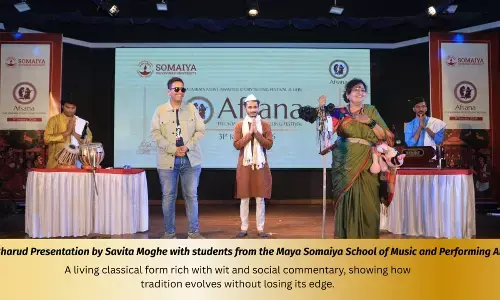How flexibility of tailoring MBA leads to streamlined career

How flexibility of tailoring MBA leads to streamlined career
An MBA degree is always associated with accelerated career growth for management graduates.
An MBA degree is always associated with accelerated career growth for management graduates. Top B-Schools are known to continuously evolve their curriculum and out of classroom activities to align their graduate skills and competencies to match the contemporary and emerging talent demand from their industry sponsors and corporate partners.
This emphasis on post-programme career outcomes has resulted in a variety of MBA programs, those focusing on strategy, deep business and functional skills and the current trend of technology-focused MBA programs.
Conventionally, successful MBA programmes have adopted curricula based on a strong academic core and supplemented with electives, also known as specialisations. The core-curriculum set sound management and leadership foundation followed by exposure to specialisation areas such as Marketing, Finance, Operations and Supply Chain that developed students understanding of various functional sub-disciplines within businesses.
This model, though well suited for firms operating in traditional businesses, is unable to address the rising talent gap faced by the industry undergoing disruptive changes that are redefining work and workplaces
Changing nature of jobs
Workplace disruptions have resulted in many of the traditional jobs to disappear, these have been either automated or are being redefined, calling for professionals with complex meta skills and competencies.
Digital transformation
While most digital businesses are thriving, the greatest challenge for a vast majority of traditional enterprises is to successfully embrace these emerging technologies and to reinvent their business models and revenue streams.
Future of work
The pandemic has accelerated the adoption of future of work practices across all the industries. There is a greater sense of urgency amongst businesses to harness the power of disruptive trends such as Industry 4.0, AI and ML and data-driven digital businesses, calling for a more agile and competent workforce.
These shifts call for professionals with an agile learning mindset, balance between depth of knowledge and breadth experiences to successfully lead change initiatives. To fulfil this growing demand of future-ready graduates, B-Schools are tailoring their MBA programme with a flexible, adaptive approach, whereby participants have choice of selecting from a pool of electives. Why is this flexibility important and what do MBA participants stand to gain from this strategy?
Personalisation
Each participant gets an opportunity to craft her MBA learning experience based on her past experience and future career aspirations. Unlike a one-size-fits-all approach, this leads to greater learning efficacy for participants.
Transferable skills
The MBA programme is an excellent opportunity for students to further nurture their domain expertise and transferable skills, allowing them to build on their existing professional skills and achievements, thus building their credibility as expert professionals.
Targeted re-skilling
In addition, a well-thought through choice of electives enables participants to acquire much focused knowledge and skills in emerging areas that addresses specific talent gaps. These new skills that supplement existing transferable skills make MBA graduates a well-rounded professional, enabling a smoother career transition into newer domains and industries.
Most traditional MBA programmes attract pre-experienced and mature participants, and by following a flexible approach to electives, both types of students stand to gain in fulfilling their post-programme career aspirations, be it vertical or lateral career growth!
- (The author is the Associate Dean (MGB), Associate Prof. (Leadership & HRM), S P Jain School of Global Management)









